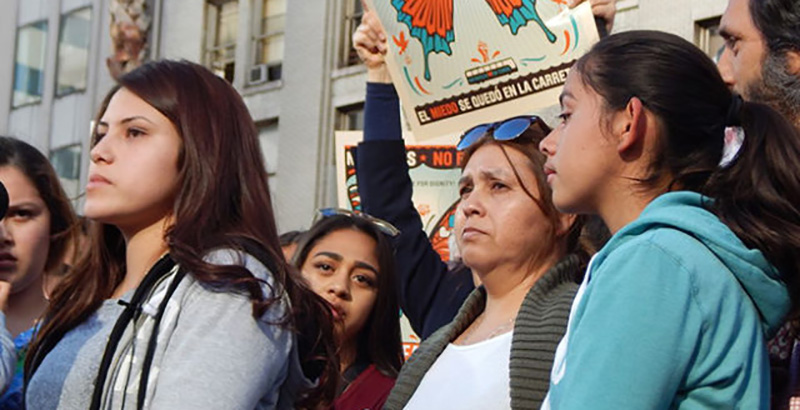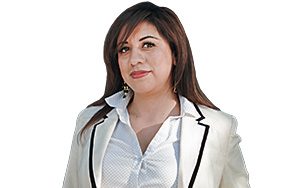Education Critical Area for Latino Voters to Exert Influence as Immigration Furor Fuels Newfound Political Activism, Experts Say

As immigration issues drive more Latinos into political activism, education is a ripe opportunity for Latino parents to wield considerable influence.
A panel of education experts at a national convention last weekend in Miami agreed that Latino parents have catapulted this year from being mostly silent on political issues to becoming a significant voice in the political scene because of what they see as hostile immigration policies.
But they have yet to flex their muscle as a voting bloc in the area of education.
The Latino vote was not a determining factor in the last presidential election and most likely won’t be in this November’s midterm elections, one panelist said. But education, another panelist said, is an area where Latinos can step up and have a big impact in their local communities.
Miami-Dade Superintendent Alberto Carvalho, who leads the nation’s fourth-largest school system, which is predominantly Latino, lamented that education isn’t talked about by President Donald Trump nor addressed as a fundamental right in this country.
“It’s shameful that education, for the first time in decades, didn’t factor as a memorable issue in the last election. I am hopeful that local activism will inspire people to advance the notion that public education and policy are part of the same coin. One suffers when the other doesn’t perform,” Carvalho said.
Carvalho was one of three panelists discussing “The Power of Education Reform as a Political Issue in 2018, 2020, and Beyond” at the National Association of Hispanic Journalists’ annual convention. The panel was sponsored by the Walton Family Foundation and moderated by Kathy Moore, executive editor of The 74.
He said he feels disappointed that the national conversation has shifted from the inhumane separation of families at the border and unaccompanied minors to the political furor over Trump and Russia, which “prevents the conversation from really being about the issues that impact kids particularly across the country.”
But Latino families are now stepping up to influence education, the panelists agreed. And they are not just active as volunteers in their classrooms but are becoming involved in the process of improving their kids’ education and their schools.
“It’s not enough just to be active at your child’s school site. Now you have to go to board meetings and fight for your school choice, talk to your superintendent. … We are seeing Latino communities take on that challenge and rise to the occasion. These are just the first steps,” said Yannell Selman, founder and executive director of P.S. 305, a nonprofit based in Miami that organizes families to engage in their children’s education.
“Now, because of the hostile climate, staying silent is not an option,” said Selman, explaining that culturally Latinos, particularly parents, used to remain silent because they felt safe if they weren’t visible. But after feeling threatened by Trump’s immigration policies, “It went from, ‘It’s not safe to say something,’ to ‘It’s not safe not to say anything,’ ” she said.
Carvalho pointed out that the role of the federal government remains very important and that states should be under “the watchful eye” of the federal authority.
“People think the bus [the federal government] is broken. The bus isn’t broken; the driver is broken,” he said, in a clear reference to the Trump administration.
Another panelist, Evy Valencia Jackson, an education advocate and policy expert based in Denver, said that despite the low numbers of Latinos participating at the polls, their political participation could significantly improve education for Latinos.
“It’s important who’s elected and who’s not, who we hold accountable for [Latino] students having the opportunity to go to college,” Valencia Jackson said. “Parents have to wake up and be politically active and say this has to change.”
While the number of Latinos nationally who are going to college is slowly increasing, they are still not graduating from college at the same rate as their peers. In 2016, 47 percent of Latino high school graduates ages 18 to 24 were enrolled in college, but just 15 percent graduated from college, according to the Pew Research Center. In comparison, about 41 percent of whites completed college.
Latinos’ high school dropout rates are also higher, at 10 percent in 2016, compared with 6 percent for all students.
The panelists agreed that Latino representation among educators should be a key aspect in the education reform conversation.
“Predominantly in Latino communities, still the leadership is not representative of classroom teachers and students and the representation at all levels, and that has a tremendous social impact on the child,” Carvalho said.
He said the Miami-Dade public schools system doesn’t have that problem because almost half its teachers are Latino. About 20,000 Latino teachers serve the district’s 354,000 students, of whom more than 70 percent are Latino. He said other districts with the same demographics should be as active as his Miami-Dade has been in recruiting Latinos.
Valencia Jackson said in some parts of the country, like Denver, that’s not an easy task.
“It’s difficult for Latinos to enter the teaching profession in the first place, because it is not a fairly paid profession,” she said. “When I said to my parents I wanted to become a teacher, my father told me that the only way I could have a better life was by making more money as a lawyer or a doctor.”
Selman said, “I’m excited and encouraged by efforts, at a national level, from education leaders and organizations that are exclusively focused on elevating blacks’ and Latinos’ educational opportunities and having more Latinos in leadership positions. The question is how do we make this systemically, not only anecdotally.”
Carvalho argued that “a lot of what’s heard on education reform is driven by well-funded, value-specific foundations that are often advancing an education reform not based on the basis of research here or in other countries, but based on their own beliefs.”
“There’s a huge difference between using words to advance education reform and actually teaching kids,” he said. “Despite the elections, there should be a forum nationally to really tackle what does the research indicate, what is working, where is it working, is it replicable — particularly in demographically similar parts of the country.”
The panelists also agreed that more accountability is needed for charter schools.
“I have experience with charters in Florida and Northern California, two very different systems, but oftentimes I see something is missing on the part of accountability for charter schools,” Selman said.
“Choice has been proven to be good. Choice is good; a reasonable, accountable choice is better,” Carvalho said.
The Miami-Dade public schools district was the first to have a district-managed charter school system, which is overseen by the district’s school board. Currently, there are 130 charter schools in the district, serving over 64,000 students in grades K-12, representing over 18 percent of the district’s enrollment.
“The idea of innovation of charter schools is really powerful. I think they have created a healthy competition. Nothing is ever perfect, but I do believe that’s why you have state and local officials to regulate the schools,” Valencia Jackson said.
She said her husband and her husband’s mother attended the same failing traditional public school in southwest Denver and that if it hadn’t been for a charter school that opened in the neighborhood, her nephew, the family’s third generation, would have had to attend the same failing school.
“The fact that there are quality options in that neighborhood is critical, and if it happens to be a charter, great,” she said. “Hopefully, there will be other good quality options that will follow.”
Disclosure: The Walton Family Foundation provides financial support to The 74.
Get stories like these delivered straight to your inbox. Sign up for The 74 Newsletter

;)
